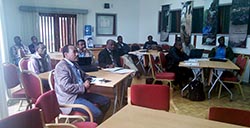N2Africa – Ethiopia held its Mid-Annual and M&E Review meeting from October 13th-14th, 2016 at ILRI in Addis Ababa. The overall objective of the workshop was to review the implementation progress of the project, in reference to the work plan 2016, and to develop strategies for improvements. The project is implemented in collaboration with diverse partners from public and private sectors, and NGOs using different methods and approaches. This semi-annual assessment of the status of implementation is required to identify lessons learnt, problems encountered and to devise solutions to rectify challenges.
|
Out of the seven Ethiopian N2Africa Public-Private Partnerships (PPPs), members of five clusters (Pawe, Jimma, North, Central and South Ethiopia cluster) attended the meeting (Picture 1). The two remaining clusters, South-East and Chewaka, were missing due to some security reasons in the Oromia region at the time the meeting was held. However, progress of the later were presented (in ppt slides) by the regional office (OARI) in Addis Ababa. |
Picture 1. Workshop participants (partial view) |
The review meeting was also attended by the N2Africa leadership team from Nairobi Fred Kanampiu (Project coordinator) and Theresa Ampadu-Boakye (M&E specialist), - Abuja Edward Baars (Senior BDO), and Wageningen, Minke Stadler (Reporting and Communication). The process of the meeting included presentation of the country work plan 2016 (overall targets and milestones), followed by progress presentations by individual partners and plenary discussions on the level of achievements and challenges.
Fred Kanampiu warmly welcomed the participants and addressed an opening remark. In his speech, he indicated that by now the project is almost three years in its program, and it is useful to bring together stakeholders periodically to discuss progress at their respective target locations. He said, he and his colleagues from the leadership team look forward to hear encouraging achievements. Challenges encountered during the implementation process will be put forward for discussion, so that possible corrections could be made for effective delivery of project milestones.
Endalkachew Wolde-meskel, Country Coordinator Ethiopia, pointed out the steady country progress partners made over the last three years and presented the work plan 2016. 2014, the year the project was launched, marked the period for an extensive establishment of on-farm trials to demonstrate the technology. This was the period the project was only gaining a foothold. In 2015, in addition to the diagnostic trials and on farm demonstrations, more effort was placed on mapping of potential legume value chain actors for organizing of PPP clusters for the project target legumes at the different corners of the country. The PPPs are essential elements, not only to N2Africa-Ethiopia but also to N2Africa as a whole, to ensure effective dissemination of technologies and farmers’ access to input and grain markets. In the 2016 season, the PPPs are in operation and inoculants from Menagesha Biotech Industry (MBI) are delivered to smallholders via Farmers’ Cooperative Unions (FCUs) and agro-dealers. Furthermore, smallholder produces are connected to market their produces collectively to grain buyers (Guts Agro-industry and Alema Koudijs Feed Plc), and to grain exporters, such as ACOS-Ethiopia.
Work plan 2016 was coined envisioning, among others:
- More technology “adoption”, through designing cost-effective and polygonal dissemination approaches (media, training, field days, adaptation and demonstration trials, etc.);
- Further strengthening of the functional PPPs;
- Sustainable inoculant and seed supply (more seed production in partnership with seed producing farmers’ cooperatives, community seed producers and private seed producing agro-industries, supporting potential last mile inoculant dealers and facilitating business agreements with MBI);
- Training of stakeholders;
- Conducting of research for closing of yield gaps (multi-locational variety by strain research).
Following the presentation of the work plan 2016, each individual partner of the PPP clusters presented their implementation progress, achievements, lessons learnt and challenges. Detailed workshop materials and partner presentations, can be accessed at from the N2Africa-Ethiopia wikispaces.
Just in brief and for the taste, from the South cluster:
- Nineteen demonstration plots in the four Woredas (Boricha, Halaba, Damote, Shala), each engaging up to 25 farmers, benefited 419 farmers;
- Field day (in two weeks’ time) to involve 300 farmers;
- 226 farmers (members of different primary cooperatives) engaged in community seed production (grain and seeds) altogether on 15 hectares of land;
- Training on legume agronomy and inoculation technology for ToT and farmers reached 795 beneficiaries;
- Over 1,050 sachets of inoculant distributed through Sidama Elto FCU and MBI. This number doesn’t include those marketed as spill-over (farmers not directly targeted by N2Africa-Ethiopia);
- Variety by strain trials installed in nine sites (six for common bean and three for chickpea);
- Data on input distribution and field books (e.g. demonstration and adaptation trials) captured on hard copy and two trainings uploaded on ODK;
- Facilitated signing of agreement between ACOS and Sidama Elto FCU for grain market and between MBI and the same FCU for inoculants delivery and marketing;
- Existence of huge market opportunities, smooth communication among the partners and the growing interest and willingness of farmers to adapt improve legume technologies were among those listed under lessons learnt during the progress presentation of south PPP cluster.
Endalkachew Wolde-meskel, Country Coordinator Ethiopia and Team


